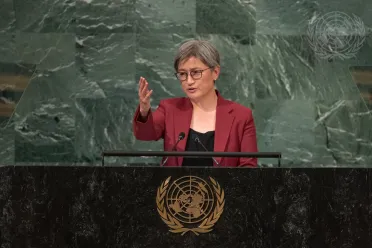Statement
Statement summary
PENELOPE WONG, Minister for Foreign Affairs of Australia, noted her country is home to people from over 300 different ancestries and to the oldest continuous culture on the planet. The Parliament she serves in is enriched by diversity, with a Government determined to make real progress on the national journey of healing with Indigenous Australians, the First Peoples of that continent. She cited Senator Patrick Dodson, the “Father of Reconciliation”, a Yawuru man from the remote north-west, tasked with responding to a call from First Nations people for a constitutionally enshrined voice to the Australian Parliament, as well as treaty and truth-telling. She further noted the ambition of an Australian who helped shape the United Nations Charter, former foreign minister and the third President of the Assembly, Herbert Evatt. At the 1945 San Francisco Conference, Mr. Evatt challenged the great powers who wanted a strong Security Council that had control over the Assembly. He did not succeed in his fight against the great powers’ veto within the Council, but he did ensure that the Assembly has the ability to decide its own course — understanding that small- and medium-sized countries must be able to maintain their sovereign choices, protected by a stable framework of rules.
She expressed alarm that for the first time, the United Nations Human Development Index had declined for two consecutive years, in 2020 and 2021, with nearly half a billion women and girls now living in extreme poverty. Further, over 800 million people go to bed hungry every night, 345 million people face acute food insecurity and 50 million people across 45 countries are on the brink of famine — a growing scale of human suffering that threatens untold global instability. Australia is therefore increasing its contribution to development assistance by over $1 billion. Turning to the environment, she noted that the world has experienced disasters and conflict in the past, but the intensity and confluence of today’s challenges are without precedent. Within this decade, 83 per cent of Australia’s energy supply will be renewable and “Australia will be a renewable energy superpower,” she said. The country is increasing its official development assistance (ODA) to the Pacific by over half a billion dollars, and an additional $470 million in development assistance in the Indo-Pacific.
The world cannot accept a situation where large countries determine the fate of smaller countries, she affirmed — which is why the Russian Federation’s illegal, immoral invasion of Ukraine cannot be normalized or minimized. It is an assertion that a larger country is entitled to subjugate a smaller neighbour, to decide whether another country can even exist. Council veto power was never intended to be used to enable unchecked abuse of the Charter — by the very countries that were given that veto. Aside from terrible damage and loss of life in Ukraine, the invasion is propelling the global crisis in food and energy security, she said “small- and medium-sized nations like my own: we are more than just supporting players in a grand drama of global geopolitics, on a stage dominated by great powers.” Her delegation therefore seeks Council reform, with greater permanent representation for Africa, Latin America, and Asia, including India and Japan. History teaches that “the alternative to what we have built here is conflict and chaos,” she stated. Humanity has benefited from the multilateral system — from the rules that have underpinned an unequalled period of human development. “Humanity will pay the price if we allow it to flounder,” she stressed.
Full statement
Read the full statement, in PDF format.
Photo

Previous sessions
Access the statements from previous sessions.
